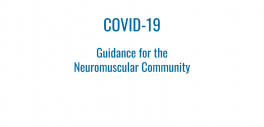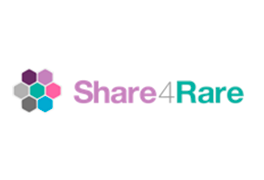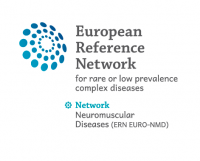|
Newsletter - March 2020 ͏ ͏ ͏ ͏ ͏ ͏ ͏ ͏ ͏ ͏ ͏ ͏ ͏ ͏ ͏ ͏ ͏ ͏ ͏ ͏ ͏ ͏ ͏ ͏ ͏ ͏ ͏ ͏ ͏ ͏ ͏ ͏ ͏ ͏ ͏ ͏ ͏ ͏ ͏ ͏ ͏ ͏ ͏ ͏ ͏ ͏ ͏ ͏ ͏ ͏ ͏ ͏ ͏ ͏ ͏ ͏ ͏ ͏ ͏ ͏ ͏ ͏ ͏ ͏ ͏ ͏ ͏ ͏ ͏ ͏ ͏ ͏ ͏ ͏ ͏ ͏ ͏ ͏ ͏ ͏ ͏ ͏ ͏ ͏ ͏ ͏ ͏ ͏ ͏ ͏ ͏ ͏ ͏ ͏ ͏ ͏ ͏ ͏ ͏ ͏ ͏ ͏ ͏ ͏ ͏ ͏ ͏ ͏ ͏ ͏ ͏ ͏ ͏ ͏ ͏ ͏ ͏ ͏ ͏ ͏ ͏ ͏ ͏ ͏ ͏ ͏ ͏ ͏ ͏ ͏ ͏ ͏ ͏ ͏ ͏ ͏ ͏ ͏ ͏ ͏ ͏ ͏ ͏ ͏ ͏ ͏ ͏ ͏ ͏ ͏ ͏ ͏ ͏ ͏ ͏ ͏ ͏ ͏ ͏ ͏ ͏ ͏ ͏ ͏ ͏ ͏ ͏ ͏ ͏ ͏ ͏ ͏ ͏ ͏ ͏ ͏ ͏
|
| |
ERN EURO-NMD launches survey on Neuromuscular Diseases & COVID-19 infection
As the European Reference Network for Neuromuscular Diseases we are trying to understand track the effect COVID-19 is having on the neuromuscular community.
Some of the patients with a neuromuscular disease can be more vulnerable to COVID19 infection. Still much needs to be learned about the indications for NMD patients and how to act in case of COVID 19 infection. Also, the approaches in each country may be different. Therefore, we would like to know how this crisis is being handled all over Europe. This may help in the management of our patients and will help to give patients the best possible care across all countries.
To do this we have developed two short surveys.
|
|
|
|
| |
COVID-19 and people with neuromuscular disorders: World Muscle Society position and advice
| |

|
Dr. Maxwell S. Damian, PhD, collated the World Muscle Society (WMS) Covid-19 advice (28th March 2020) for neuromuscular patients, carers, general neurologists and non-specialist medical providers. This document is also intended to inform neuromuscular specialists particularly regarding frequently asked questions and basic service requirements. The advice is endorsed by the Members of the Board of the WMS, colleagues from the Editorial Board of Neuromuscular Disorders, the official journal of the WMS, European Academy of Neurology (EAN) Scientific Panel Muscle & NMJ disorders, and our network's Executive Committee.
|
|
|
|
|
| |
COVID-19 advice for those with Myasthenia Gravis
Coronavirus: ALERT on the use of chloroquine in myasthenia gravis Please note: in myasthenia gravis, chloroquine, erythromycin and telithromycin are an absolute contraindication. These treatments can make your condition worse and are likely to trigger a flare-up. Find out more on the AFM website
|
|
|
|
| |
Guidance for the management of Myasthenia Gravis (MG) and Lambert-Eaton Myasthenic Syndrome (LEMS) during the COVID-19 pandemic
This article has been developed to offer guidance for those people who are affected by Myasthenia Gravis or Lambert-Eaton Myasthenic Syndrome.
As most patients with MG are on immunosuppressive or immunomodulatory therapies and may also have respiratory muscle weakness, there is a theoreticla concern that MG/LEMS patients may be at higher risk of contracting the infection or experiencing severe manifestations of COVID-19.
|
|
|
|
| |
EMA advises continued use of medicines for hypertension, heart or kidney disease during COVID-19 pandemic
Press release 27/03/2020 EMA is aware of recent media reports and publications which question whether some medicines, for instance angiotensin converting enzyme (ACE) inhibitors and angiotensin receptor blockers (ARBs, or sartan medicines), could worsen coronavirus disease (COVID-19). ACE inhibitors and ARBs are most commonly used for treating patients with high blood pressure, heart failure or kidney disease. It is important that patients do not interrupt their treatment with ACE inhibitors or ARBs and there is no need to switch to other medicines. There is currently no evidence from clinical or epidemiological studies that establishes a link between ACE inhibitors or ARBs and the worsening of COVID-19. Experts in the treatment of heart and blood pressure disorders, including the European Society of Cardiology, have already issued statements along those lines. To gather more evidence, EMA is proactively reaching out to researchers working to generate further evidence in epidemiological studies. As the public health crisis rapidly extends across the globe, scientific research is ongoing to understand how the severe acute respiratory syndrome coronavirus 2 (SARS-CoV-2) reproduces in the body, interacts with the immune system and causes disease, and whether ongoing treatment with medicines such as ACE-inhibitors and ARBs could impact the prognosis of COVID-19. |
|
|
|
| |
COVID-19 advice for the NMD community
The current guidelines regarding COVID-19 exposure and preventive measures can be found on the World Health Organisation (WHO) website. Guidelines in English
Guidelines in French
In order to inform the neuromuscular community we have prepared the following information to keep the community up to date on best practices for managing the global spread of SARS-CoV-2 (COVID-19). The new virus is called SARS-CoV-2, which is part of the family of betacoronaviruses. The disease caused by SARS-CoV-2 is now known as COVID-19. The virus is spread from 1) person-to-person exposure (principal means of transmission) and 2) surfaces exposed to the virus. Exposure is by respiratory droplets produced when an infected person coughs or sneezes leading to transmission to others in close proximity. A challenge is that some transmission can occur before an infected individual becomes ill making it hard to isolate that individual.
Symptoms may appear 2-14 days after exposure and include fever, cough, and/or difficulty breathing.
For neuromuscular disease patients, it is important that you seek prompt medical attention if you or anyone in your household is identified with symptoms consistent with COVID-19 or in case of documented exposure to an individual who has tested positive. Before seeking care, you should contact by telephone the help lines established in your country or your usual healthcare provider. In case you need to be seen by your healthcare provider it is important to notify them of your symptoms and potential exposure to the virus, prior to attending the office. This will ensure that proper precautions can be taken to help keep others getting infected or exposed. Your healthcare provider will provide you with guidance regarding your symptoms and if you should be tested. You should attend an Emergency Room or Urgent Care facility if you are having shortness of breath or experiencing worsening symptoms. But it is important that you call the emergency line in your country and notify them of the suspicion of COVID19 before you go. By doing that, they will be able to take the appropriate protective measures for your journey to hospital and your arrival.
|
|
|
|
| |
EU Commission launches “COVID-19 Clinical Management Support System”

| |
On 24 March, the European Commission launched the “COVID-19 Clinical Management Support System” with the aim to support clinicians in hospitals that are currently facing the coronavirus emergency all over Europe. Based on the experience with the European Reference Networks, the initiative will help to create rapid connections across Europe among the hospitals indicated by the Member States as reference centres for COVID-19. Clinicians can rely on a dedicated helpdesk managed by DG SANTE to set up web conferences and exchange with their peers in Europe on possible treatments, and on how to handle severe and complex cases. This synergy aims to speed up the adoption of specific treatment options and help reduce some of the uncertainties due to the unknown aspects of the virus. Ultimately, it is in the vital interest of the patients infected with COVID-19 that their doctors can discuss their cases, and get the best advice possible.
|
|
|
|
|
| |
Translational Summer School Postponement

| |
We are sad to announce that we have taken the difficult decision to postpone the 2020 Translational Summer School which was due to be held in Leiden in July. We fully anticipate that this will now take place in July 2021. Logistically, the week sees numerous speakers traveling to the summer school to deliver their topics, catering and accommodation needs to be reliably available and the attendees able to get to the venue. All of these aspects have become much less certain it the current crisis. It would irresponsible of us in so many ways to attempt to run the summer school when the situation is so volatile. We sincerely apologise for any inconvenience this may have caused and we will be making further announcements about 2021 Summer School shortly.
|
|
|
|
|
| |
EURO-NMD takes part in rare diseases day at the European Parliament

| |
People living with SMA, ALS and other rare disease was the focus of the Rare Disease event at the EU Parliament on 18 February. The event was organised by Biogen in collaboration with EURORDIS, the patient organisation for rare diseases, hosted by the Members of the European Parliament Tomislav Sokol, Stelios Kympouropoulos and Loucas Fourlas and Stella Kyriakides, EU Health and Food Safety Commissioner, spoke at the event. Bringing together patient organisations, medical professionals, European institutions representatives and industry, the event provided a unique opportunity to partner with the rare disease community to discuss the importance of centralised and standardised registries for collecting real world evidence, early diagnosis and maintaining current orphan drug regulatory framework. We are delighted that EURO-NMD was represented by Executive Committee member Dr. Jan Kirschner. Highlights of the event included the opening of “Bigger than Life,” an exhibition of work by Phil Herold, an internationally recognised artist living with SMA, and a performance by Noemie Sunnen, an opera singer living with ALS. These talented creative professionals helped us raise awareness about rare diseases.
|
|
|
|
|
| |
Understanding how neuromuscular diseases impact learning and working opportunities for patients and carers
| |

|
Share4Rare has opened a new study to learn more about how living with a neuromuscular disease impacts educational and employment opportunities for patients and caregivers. Share4Rare is building an online community of rare disease patients and carers to provide a space for people to learn more about their disease, connect with others and participate in research. More information about the study and how to register to participate is available on the Share 4 Rare website.
|
|
|
|
|
| |
Changes to Upcoming Meetings and Events
As we become aware of future meetings being rescheduled, cancelled or moved to an online format we will make the appropriate adjustments to the information on our website.
At this very uncertain time we are trying to ensure we capture all changes but we would ask if you know of any changes to meetings that are of interest to the neuromuscular community to let us know so we can help inform the whole community - info@ern-euro-nmd.eu
|
|
|
|





